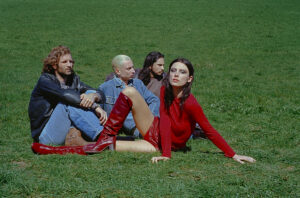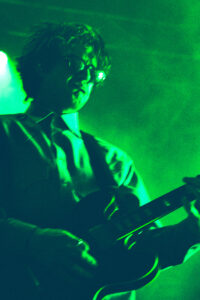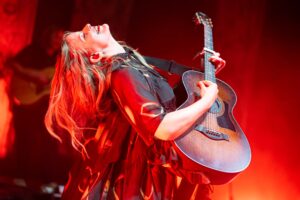SONGS FOR THE LIVING AND THE DEAD: A NIGHT WITH SHOVEL DANCE COLLECTIVE
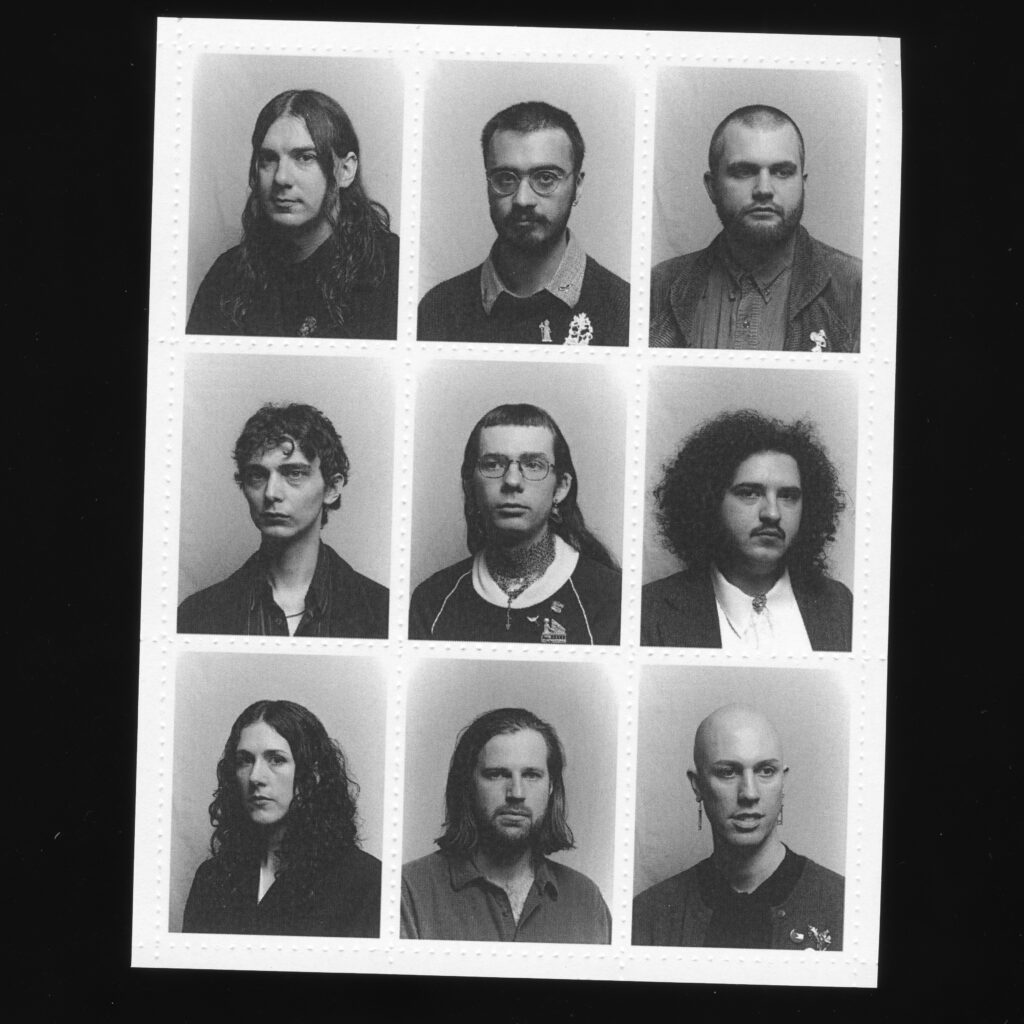
LIVE REVIEW | SHOVEL DANCE COLLECTIVE w/ Resonant Bodies, Spitzer Space Telescope, Milkweed | LONDON EartH THEATRE 29th April 2025 by Georgina Daniels
After two weeks of traversing shifting European landscapes on tour, Shovel Dance Collective arrived at EarTH Theatre with their characteristically sincere, somber soundscapes in tow.
The stage itself was a visual overture—a bounty of instruments and tangled cables that felt like pirate treasure, inviting curiosity and chaos. Suspended on stage left, a white cloth tapestry declared “Revenge! Workers to arms”, swaying gently like a ghost of protest. Above the performers hung a second tapestry: the vivid, folkloric image from their 2024 album The Shovel Dance. It felt like peering into a centuries-old painting at the National Gallery—a window into some mythic rural rebellion, waiting to be heard. And just in front of the stage, nestled in the proscenium, was an extraordinary flower sculpture by artist Alice Jennings (@alice.jennings)—organic, surreal, and quietly powerful. It grounded the space in something tender, alive, and uncanny, like folk myth taking root in real time.
This was a night steeped in collective effort—thanks in part to the ever-expanding folk and folklore network surrounding Shovel Dance, including the trail-mapping Weird Walk project (@weird_walk) and the vital community-building work of Broadside Hacks (@broadsidehacks). From this layered visual and cultural world, four genre-bending acts would launch across a night that felt part ritual, part protest, part rave.
This was not a night of easy listening. Solidarity with Palestine echoed in speech, flag, and refrain. Stories of exile, labour, and anti-capitalist fury rolled in waves across the crowd, asking not just for attention—but transformation.
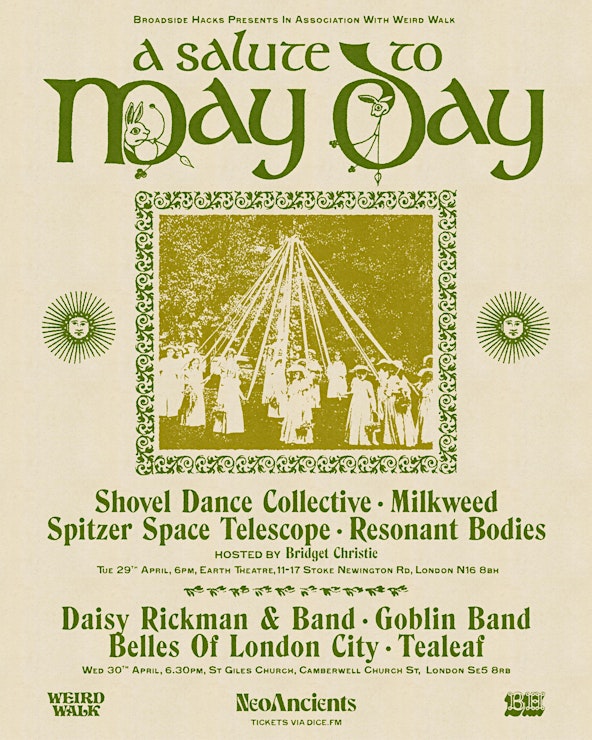
At first glance, Resonant Bodies’ set felt tightly composed—medieval-folk precision, measured pacing. But only later, after a passing mention between songs, did it fully register: everything had been improvised. Their pairing of nyckelharpa and Swedish dulcimer shimmered delicately, the sound bouncing off the theatre’s hallowed architecture like soft echoes in a cathedral.
There was a kind of anxious elegance in their interplay—not neurotic, exactly, but intense and cleansing, like a musical deep breath before a storm. They joked about playing “before the good stuff,” but this was already it—25 minutes of uninterrupted intuition, where the music was the personality.
The night shifted again, this time toward Spitzer Space Telescope—Chicago-born, but steeped in Irish folk. There was something striking about hearing such traditional songs delivered by someone geographically distant but deeply embedded in the culture: a transatlantic kind of reverence, not imitation.
Opening a cappella, he anchored the room with sharp, sparse storytelling. Lines like “the name Galileo will never be heard” and “reaping and tilling the ground as he goes” clung to the air long after they were sung. One song careened into a stomping, cheeky rhythm that bordered on a barn-floor rave—a joyful detour that reminded us folk isn’t just for mourning. It is living, laughing, volatile.
Milkweed twisted the energy into something primal. Their set was a full-body ritual—guttural cries, overdriven banjo, theatre soaked in menace and myth. A tale of exile unfolded through body and sound, culminating in a dancer wearing a sprawling antlered mask that made the air feel thick with folklore.
Musically, they weren’t the most textured of the night, but the drama was undeniable. It was drone-folk-as-séance: unnerving, mesmerizing, unforgettable.
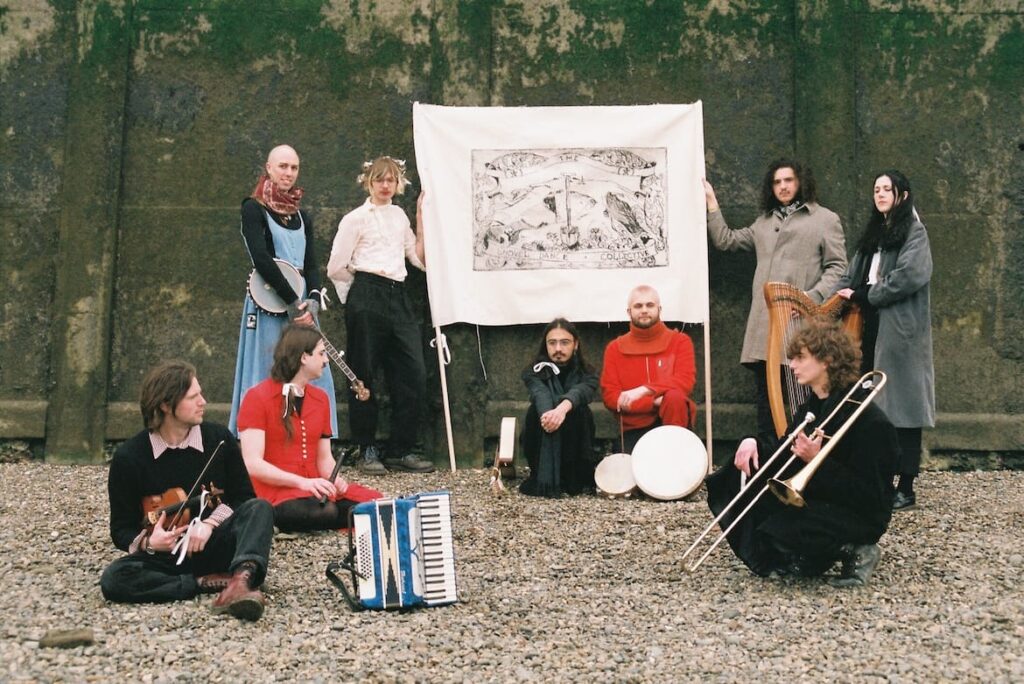
And then, Shovel Dance Collective took the stage—and the room brimmed with something close to devotion. A breathy flute intro unfurled like mist, soon joined by swelling vocals and dense instrumental layers. They describe what they do as “songs and tunes in the old way,” but what followed felt ancient and futuristic at once: droning work songs, Hampshire field laments, and harmonized crescendos stacked with trombone, fiddle, distortion, bells.
Between songs, they spoke—not just of music, but of trans rights, Palestinian liberation, the radical joy of singing together. One moment conjured the frenzy of a fox hunt with fiddle lines so vivid it felt like riding through colour; the next fractured into joyful chaos—disorderly, hopeful, defiant.
A particular high point came with The Merry Golden Tree, a song that had already carried emotional weight for many before the performance even began. Hearing it live, in a space so saturated with resistance, mourning, and hope, felt like a tipping point. It was a reminder of how music arrives in our lives during personal thresholds and historical ruptures alike. In the wake of a searing speech about Gaza, a quiet grief settled over the room. The music didn’t seek to soothe it—it stood beside it.
Before the final number, one of the collective offered a reflection—offhand, funny, and strangely moving. This is us, he said. And if, thousands of years from now, a stowaway aboard an intergalactic vessel finds a quantum harp and plays our music—even though we’re all long dead—we’ve made it. It was Treasure Planet by way of the English folk tradition: banjos in space, held together by love, politics, and a refusal to be forgotten. Folk, he reminded us, is a tradition that invites the dead to sing with the living.
And yes, there was a raucous singalong at the end—somewhere in the chorus, a call to kill a policeman. Folk rage, folk rave indeed.
